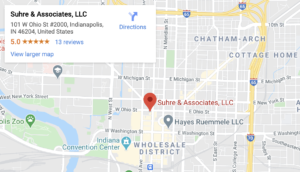
Everyone loves watching a dramatic criminal trial on television. But did you know that over 95 percent of charges result in plea deals instead of trial?
A plea deal, also known as a plea bargain, occurs when a criminal case is resolved before trial.
Typically, a plea deal states that the prosecuting attorney will:
- Not charge certain offenses, or move to dismiss charged offenses;
- Recommend a specific sentence or sentencing range; and/or
- Agree that certain aggravating factors or particular sentencing factors do not apply.
Both Indiana and federal criminal procedure allow plea deals. The laws of both jurisdictions are very similar.
Table of Contents
Public Policy and Plea Deals
Plea deals are allowed as a matter of public policy, and they have many justifications, such as:
- Busy courts. A judge’s court calendar is packed, and typically trial dates have to be scheduled months or even years in advance. Plea bargains keep disputes off the court calendar.
- Crowded prisons. Both Indiana and federal prisons are overcrowded. For nonviolent or minor offenses, plea deals reserve prison space for those criminals that pose significant threats to society.
- Limited resources. Prosecutors have limited time. It simply is not possible to try all defendants in court. Plea bargains allow prosecutors to focus their trial efforts on the most dangerous criminals.
Finally, plea deals bring certainty of the defendant’s fate to all parties. On the other hand, juries are unpredictable, and no one ever knows whether they will find a defendant guilty or not.
Should You Accept a Plea Deal?
You should always speak to a criminal defense attorney before you accept a plea deal. Your attorney can advise you whether the deal is fair or whether trial might offer a better result.
If you’ve been charged with a crime, there are pros and cons to accepting a plea deal, including:
- Reduced cost. A trial is a lengthy endeavor, and there is no guarantee that it will result in a not guilty verdict. By agreeing to a plea deal, you can save the significant expense of a drawn-out legal process.
- Weak case. It’s possible the prosecution has a weak case. While they won’t disclose this, an experienced defense attorney can tell you. The weaker the prosecution’s case, the better the chance for a favorable plea deal.
- Harsh sentencing. For decades, public policy has favored stiff prison penalties for crimes. A plea deal can avoid these and result in a significant reduction or elimination of the sentencing term.
There are, however, disadvantages of plea bargains. It is likely that you’ll have to admit guilt to at least one charge, and this can carry serious consequences for you, including difficulties finding a job or losing a professional license.
The Mechanics of a Plea Deal in Court
The defendant enters a guilty plea at the initial hearing, sometimes called an arraignment. The court is notified of a plea deal.
Upon admitting guilt, the court will advise the defendant of several rights, including the right:
- To plead not guilty
- To have a jury trial
- To counsel
The judge will address the defendant personally in open court to assess whether the plea is voluntary. Then the court considers the plea deal. It may accept it, reject it, or modify the deal.
Confidentiality of Plea Deal Discussions
Plea discussions can put you in a precarious position – you may very well be admitting facts or guilt to the prosecutor. However, Indiana and federal law provide protections.
Under both systems, the following are not admissible at trial:
- A guilty plea that the defendant later withdraws.
- Any statements made in proceedings on pleas.
- Any statements made to the prosecutor during the plea discussions.
There are a couple of exceptions. A court may admit a defendant’s statements during plea discussions if:
- Fairness requires that those statements should be considered with other related statements made in a proceeding; or
- In a criminal proceeding for perjury, any statements made under oath by the defendant.
In other words, if there is a conflict between a defendant’s statements in a criminal proceeding and those made in plea negotiations, they may be admissible.
Alford Pleas
Alford pleas are a guilty plea where the defendant pleads guilty to a criminal act but maintains their innocence. The defendant simply accepts that they cannot defend themselves against the prosecution’s charges and hopes to receive a lesser sentence by avoiding a lengthy trial.
Indiana is one of the few states that does not allow Alford pleas.
In federal practice, prosecutors may consent to an Alford plea only “in the most unusual circumstances and only after a recommendation for doing so has been approved by the Assistant Attorney General responsible for the subject matter or by” a more senior Department of Justice Official. When seeking approval, the federal prosecutor must explain the “circumstances supporting the requested consent to the plea.”
Seek Legal Counsel if You Have Been Charged With A Crime
Being charged with a crime is a serious and potentially life-changing event. Consider hiring our experienced criminal defense lawyers. We will advocate for your rights and do everything in our power to achieve the most favorable outcome for your charges
For more information, contact the criminal defense attorneys at Suhre & Associates DUI and Criminal Defense Lawyers give us a call today at (317) 759-2599 or visit us at our Indianapolis law office.

